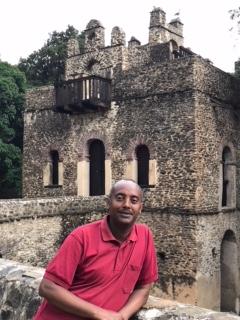
Entering the European market for religious tourism
Developing countries all over the world have incredibly rich and diverse religious tourism products, and there are numerous opportunities to develop the sector to attract tourists from Europe. Believers and non-believers are attracted to a wide range of attractions that include sightseeing and spiritual experiences. They seek meaningful experiences and welcome the opportunity to enjoy religious and spiritual experiences with other like-minded travellers. Operators in the sector must understand the travel motivations of European religious tourists. For that, it is important to understand well what the religious travel product in their destination is so they can attract European visitors.
Contents of this page
- What requirements must religious travel products comply with to be allowed on the European market?
- Through what channels can you get religious travel products on the European market?
- What competition do you face on the European religious tourism market?
- What are the prices for religious travel products on the European market?
1. What requirements must religious travel products comply with to be allowed on the European market?
European tour operators have to comply with strict requirements to ensure the safety of their customers overseas, as well as to protect them financially. These operators expect foreign suppliers to adhere to their own codes of conduct, and terms and conditions. If you will be selling your religious tourism product to them, it is important that you understand these requirements.
What are the mandatory and additional requirements that buyers have?
The mandatory and voluntary requirements for religious tourism services are common across the sector. Read the CBI’s report on the requirements for tourism services in the European market and familiarise yourself with comprehensive details of legal, non-legal and common requirements, such as:
- The European Package Travel Directive
- General Data Protection Regulation (GDPR)
- Liability insurance and insolvency protection
Rebuilding religious tourism experiences after Covid-19
The COVID-19 pandemic has caused severe long-term problems for the tourism industry worldwide. Most European countries continue advise against any travel outside the EU. While some restrictions are gradually being lifted, recovery of the tourism market is not expected until 2021 or later. This will affect all tourism sectors, including religious tourism. For example, the Hajj 2020 in Mecca allowed only 1,000 people among residents and other Saudis, instead of the 2.5 million who normally attended in previous years.
When travel restrictions are lifted or adjusted accordingly, it is likely that Europeans travelling for religious purposes will travel cautiously and in fewer numbers than before the pandemic. How you communicate with potential travellers will be key to building relationships moving forward. Do not try to market your religious travel product during this time of crisis, but if you have a website keep it regularly updated to inform future customers about the situation in your region.
Tips:
- Read the CBI study Managing Risks in Tourism to learn about measures that you can implement during this crisis and to prepared for future crises.
- For more information about the COVID-19 pandemic, read the study How to respond to COVID-19 in the tourism sector.
- To help you win back consumer confidence, check the resources offered by Trekksoft about resuming travel in 2020.
What are the requirements for niche markets?
Understand your religious tourism offering
As a niche segment, religious tourism represents a substantial travel market. Religious tourists from Europe includes believers, who travel to worship, pray, or learn more about their religion, as well as other tourists who visit religious sites and destinations because of their historic, architectural, and cultural values. Believers and non-believers often take on this type of religious sightseeing as part of one or more activities during their trips.
Religious tourism has two major categories: pilgrimage and sightseeing. The first covers travel for religious or spiritual reasons, while sightseeing tourists will tour religious monuments, sites, buildings, places of worship, etc. However, the lines are usually blurred, since a person on a sightseeing trip could well be taking part in a long-anticipated pilgrimage, such as when people take a long trip to visit some of the holy sites in Jerusalem and Palestine. The Vatican, for example, is an important site for Catholics, but millions of non-Catholics visit its museums.
The table below provides some examples of religious tourism experiences that may exist in your destination.
Table 1: Examples of Religious Experiences around the World
| Type of Religious Experience | Typical Places | Bits of Information |
| Sacred sites and places of worship | Churches, cathedrals, mosques, synagogues, temples, other holy places | Developing countries all over the world are rich in sacred and holy places that attract numerous believers and non-believers every year. |
| Holy cities and regions | Sacred City of Varanasi, India Mecca and Medina, Saudi Arabia Jerusalem, Israel and Palestine | These are important destinations that are broader than a single site. |
| UNESCO World Heritage Sites | Sacred landscape of Bagan, Myanmar | There are numerous UNESCO sites with religious meaning. |
| Religious events and festivals | Hajj, Saudi Arabia Kumbh Mela, Northern India Timket, Ethiopia | Major religious events and festivals are often very large and attract thousands, sometimes millions of people. |
| Pilgrimages | Camino de Santiago, Spain Adam's Peak, Sri Lanka | See this blog post with the 10 best pilgrimages for modern travellers, highlighting pilgrimages. |
| Retreats and camps | The Bridges Retreat Centre, South Africa Gaia Tree Center, Peru | Destination for religious, spiritual or healing retreats and faith-based camps. |
Source: Acorn Tourism Consulting
Tips:
- It is important for you to know the religious tourism product in your destination well, so conduct a thorough research exercise to fully identify local attractions.
- Download the CBI study Market potential for European Religious Tourism to find more detailed information.
Offer authentic, immersive and spiritual experiences
Having a spiritual experience is a key motivation for religious tourists, for both believers and non-believers. The market for spiritual experiences has been growing in recent years, as religious tourists seek experiences that are interesting, personally fulfilling and that connect them spiritually to a place. Experiences that you offer should focus on meaningfulness and self-value, relaxation and escape from the stresses of everyday life.
Activities can be broad, ranging from pilgrimages and visits to religious attractions aimed at both believers and non-believers. Spiritual experiences that focus on the inner self, like meditation, mindfulness training and yoga retreats are more likely to appeal to non-believers.
At retreats or places that cater for groups of religious tourists, usually believers, participants like to meet up with like-minded people, who share the same interests and goals. Learning about the culture of the destination and interacting with local people to understand their way of life are important factors that also contribute to spiritual satisfaction.
Tips:
- Offer a range of spiritual activities that appeal to different groups of religious tourists, such as talks by a spiritual leader, or mindfulness and mediation sessions in a place of spiritual importance.
- Provide group opportunities for like-minded people to get together, such as communal meals, events lead by theologians, with set times for meditation, mindfulness or prayer.
- Make sure the guides or leaders of the sessions are knowledgeable, well informed and have undergone suitable training. Employ guides that can speak the language of the visiting tourist or English at the very least.
- Ensure your experience includes interaction with locals to enhance authenticity, such as visits to people’s homes, joining in on local religious or spiritual festivals, or volunteering with a mission or other organisation.
- To find out more spiritual inner wellness tourism, read the CBI study What are the opportunities for inner wellness tourism from Europe.
Accommodating large numbers of religious tourists
If your destination is catering for large numbers of religious tourists at a particular time of year, for instance during a festival, think whether you could combine your experience with other tourism services in a convenient package. Connecting with accommodation providers, restaurants, and transportation providers to offer a range of suitable services in one package will help to provide good service and may encourage more bookings.
Religious tourists travelling to take part in pilgrimages, festivals or ceremonies tend to be less interested in luxury or quality of accommodation. However, European tourists will want to know that their accommodation is safe, secure and clean, with suitable bathroom facilities. If dormitory accommodation is typical for religious tourists in your area, make sure there are separate dormitories for men and women. Unmarried religious tourists will usually not wish to share a dormitory with members of the opposite sex.
Tips:
- Undertake an accommodation audit to ensure you know what the accommodation options are for larger groups at your destination.
- Approach a variety of accommodation providers to see if they would be interested in partnering with your organisation.
- Contact the local tourist board to see if they can put you in touch with potential partners.
- When deciding who to partner with, make sure they have adequate insurance protection as outlined in the section What are the requirements for religious travel products to enter the European market.
2. Through what channels can you get religious travel products on the European market?
How is the end market segmented?
In Europe, the predominantly Christian countries of Germany, UK, France, Italy, Spain, and the Netherlands are the most important markets for religious tourism, accounting for approximately 50% of religious tourists worldwide. France and Germany are interesting markets for Islamic sites, as they have large populations of Muslims, and the UK is a key market for religious tourism to India. For more information about the European markets for religious tourism, consult the CBI study The European market potential for religious tourism.
Religious tourists include all age groups, so you must consider the needs of young and old travellers. The chart below discusses the various characteristics of both believers and non-believers within each group.
Table 2: Characteristics of religious tourists
| Group | Characteristics of Believers | Characteristics of Non-Believers |
Younger Religious Tourists (Aged 18–29) | Traditional, conservative upbringing Trips often initiated by local church or religious group Religious trips may include elements of volunteering Fellowship and meeting like-minded people important Travel on a budget | Enjoy spontaneous or planned sightseeing trips to visit religious sites, such as temples, churches while on an adventure or other trips Often make their own arrangements (FITs) Travel on a budget |
Mid-Life Religious Tourists (Aged 30–54) | Seek spiritual fulfilment Also interested in historical and cultural elements of destination — learning is important to them Enjoy ceremonies, festivals Like an immersive experience and meeting local people More likely to go on a pilgrimage | Seek spiritual fulfilment Enjoy historical and cultural learning when visiting a destination Enjoy immersive activities including attending festivals, meeting local people |
Older Religious Tourists (Aged 55+) | More likely to take a guided trip through a specialist tour operator Enjoy a variety of excursions during trip; good guides important More likely to take a once-in-a-lifetime trip to iconic destinations, such as Mecca or Holy Land Luxury accommodation and good food more important to this group Spend more money than other groups and have more time to travel | Will also take a guided trip through operator, specialist or otherwise, enjoying variety of excursions on trip, religious or not Luxury accommodation and good food important to this group Will spend more money than other groups |
Source: Acorn Tourism Consulting
Through what channels do religious travel products reach the end market?
Specialist faith-based tour operators are the most common method for religious tourists, primarily believers, when booking guided or self-guided religious trips. Trips are generally booked either by the religious tourist or, if travelling in a group, by their church or religious group.
There is also an element of direct sales to tourists who are making all their own travel plans, usually fully independent travellers (FITs), either before they travel or once they have reached their destination. This group is made up of believers and non-believers. Bookings are either made directly with a local tour operator or through an online travel agents (OTA).
Chart 3: Sales Channels for Religious Tourism Trips, Experiences
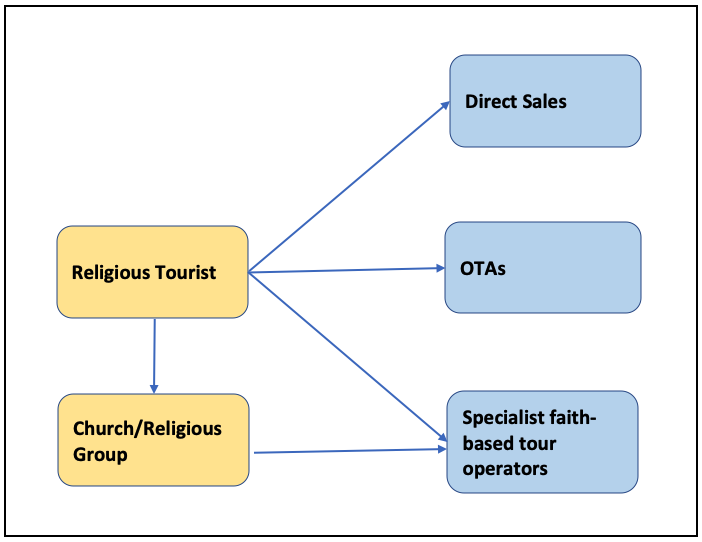
Source: Acorn Tourism Consulting
Specialist Faith-Based Tour Operators
There are many faith-based tour operators throughout Europe, and many of these will be looking to local tour operators to supply trips and experiences. Some general tour operators have a religious or spiritual segment within their portfolio of holidays.
Some examples of faith-based tour operators include:
- Christian operators such as McCabe Pilgrimages conduct a range of trips to international destinations, including the Holy Land, Ethiopia, Armenia, Jordan, and Nepal. Tours for Christians provide guided and self-guided tours.
- Worldwide Christian Travel operates to a wide range of destinations worldwide.
- Part of Globus Faith and UK operator Cosmos offer a range of faith-based tours.
- French operators offering religious tours include Ictus Tours and Cercle des Vacances.
- French adventure operator Voyages du Monde also provides trips to Buddhist nations, such as Cambodia, Myanmar, and Vietnam.
- Italian operator Conscious Journeys organises travels to a number of Asian destinations for religious and spiritual purposes, including Bhutan, Sri Lanka and India.
- In Germany, operator Expenova organises spiritual tours and pilgrimages to India and Nepal.
- In the Holy Land, the Holy Land Incoming Tour Operators Association (HLITOA) represents 50 tourism professionals that serve the Holy Land, including Palestine, Israel, Jordan, and Egypt. This is a useful resource for research, particularly FITs.
Many OTAs such as GoOverseas and GetYourGuide offer specialist religious, cultural or spiritual trips. Both of these offer a range of religious and spiritual activities, experiences and trips to numerous destinations. OTAs are increasingly recognising the popularity of spiritual experiences and are including them as categories on their sites.
Consider signing up with an OTA if there is one that suits your needs. This guide with 95 Places to List your Tours is helpful to identify possible OTAs, but remember that this is a dynamic market. Some OTAs may cease to exist and there are likely others that quickly appear and grow in market. This detailed study, Working with OTAs, will help you plan a strategy.
If you have a website, you will be better able to reach the European market of FITs interested in taking part in religious activities on holiday.
What is the most interesting channel for you?
Connecting with European faith-based tour operators that specialise in holidays to your destination offer the best opportunities for reaching European religious tourists, predominantly believers, but also non-believers who are interested in historical and cultural experiences.
Tips:
- Contact your local places of worship to find out if they have any links with European tour operators and see whether you can establish a relationship with them.
- Read the following CBI studies to help you make business connections with the European market: 10 tips for finding buyers on the European tourism market and Entering the European market for the FIT segment.
- For advice on working with OTAs, read the CBI study 10 tips for organising your tourism services export to Europe.
- To find out how to build a website, read How to be a successful company online.
3. What competition do you face on the European religious tourism market?
Which countries are you competing with?
Religious tourists use the internet widely for research into their destinations. They consult blogs and portals, such as the Complete Pilgrim and Sacred Destinations. These sites will also be useful for you to understand the competitive market within your region and further afield.
Religious tourism is widespread. Developing countries offer particularly rich opportunities for European religious tourists. Israel, Palestine and Saudi Arabia are the world’s leading destinations for Christians and Muslims, but there are many competing destinations in religious tourism. The top developing countries in the European religious market are: Egypt, Ethiopia, India, Myanmar, Palestine, Peru, and Thailand.
Egypt
Egypt has great religious significance for both Christians and Muslims and there are many important sites in the country. Cairo has many important mosques, such as the Al Azhar Mosque and the Mosque of Ibn Tulum. Christian sites include the Al Bagawat Cemetery in the Western Desert, with more than 200 domed mausoleums, and monasteries, such as the Monastery of St Anthony in a remote location by the Red Sea.
Before the COVID-19 pandemic, Egypt’s tourism industry had recovered strongly following the 2016 terrorist attacks. In 2017 religious tourism to Egypt was given a boost when Pope Francis confirmed the country would be included as an official Roman Catholic pilgrimage destination from 2018. The tourism industry created a special tour for pilgrims to recreate the steps supposedly taken by Joseph, Mary and Jesus, when they fled from King Herod after the birth of Jesus.
Ethiopia
Orthodox Christianity is the predominant religion in Ethiopia, accounting for almost two-thirds of the population. Islam is practised by the other third of Ethiopians. The country is home to a number of significant religious sites, including the rock-hewn churches of Lalibela on the Northern circuit, a designated UNESCO Heritage site. Other important sites include the Mother Church of Ethiopia, which supposedly houses the Ark of the Covenant, the ancient city of Axum, and the preserved ruins of 600 stelae and underground tombs. The country hosts a number of Christian celebrations throughout the year, including Easter, Christmas and Timket, one of Ethiopia’s greatest festivals, during which a model of the Ark of the Covenant (the Tabot) is paraded around various towns for a 24-hour period. Such festivals have become important travel experiences for visitors. In Eastern Ethiopia, Harar is an Islamic site of significance, known as the City of Saints and regarded as the world’s fourth holiest city after Mecca, Medina and Jerusalem.
Before the COVID-19 pandemic, tourism industry experts expected religious tourism to rise in Ethiopia and become one of the nation’s most important tourism niches.
India
India is well known as a religious and spiritual destination, attracting tourists from all over the world to experience its spiritual diversity. Hinduism is the predominant religion, the world’s third-largest religion by number of followers. The country is home to thousands of Hindu temples and shrines which play an important part in daily life. The sacred city of Varanasi (or Benares) on the banks of the River Ganges is considered the most sacred place for all Hindus, but is also important for Buddhists and Jains. Other well-known places for pilgrimage include the temples of Tirupati, the monasteries at Spiti, the holy twin cities of Haridwar and Rishikesh, the Golden Temple of Amritsar, and Puskhar, where a famous fair attracts between 200,000 and 400,000 pilgrims every year. Read more about some of India’s holy and spiritual places on this blog post about spiritual places in India.
In 2018, India’s Ministry of Tourism identified religious tourism as an area for growth. The Ministry launched the Incredible India 2.0 Campaign to promote religious and spiritual tourism products to the international market and improve infrastructure around religious sites. Spiritual activities that promote inner peace, well-being and self-awareness are particularly popular among European religious tourists. A key target market for India is the UK.
Myanmar
Myanmar’s culture is heavily influenced by its long history of spirituality and religion. Almost 90% of Burmese people are Buddhist and there are many thousands of pagodas and temples throughout Myanmar. Yangon is home to the Shwedagon Pagoda, the most sacred and majestic in the country. The ancient city of Bagan is a UNESCO World Heritage Site, home to more than 2,200 temples including the Shwezigon Pagoda. Early morning hot air balloon rides over Bagan are a common tourist experience.
Chart 4: Hot air balloon rides over the ancient city of Bagan, Myanmar
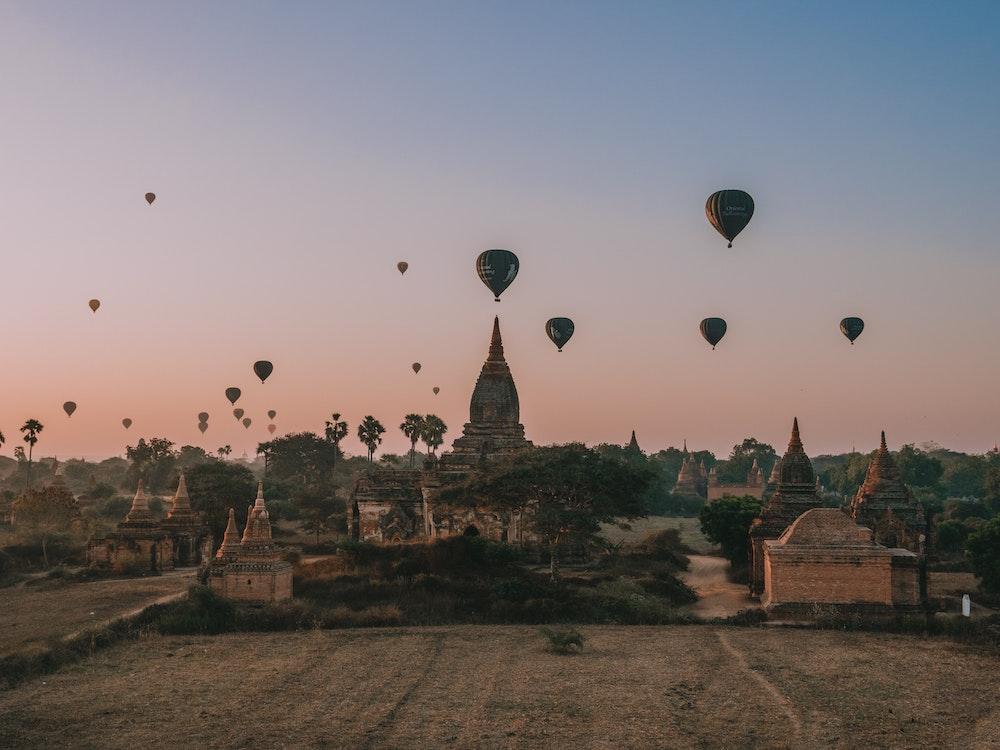
Source: Majkell Projku, Unsplash
Numerous working monasteries in Myanmar are open to visitors, often intricately decorated and well maintained. The Shwenandaw Monastery in Mandalay is a popular pilgrimage destination, while the Sule Pagoda in Yangon is a place for peace and meditation.
Palestine
Palestine is inextricably linked to the history of Christianity, Islam and Judaism, so many sites are important pilgrimage destinations, including Jerusalem, which remains at the heart of the Israel-Palestine conflict. East Jerusalem and Bethlehem are home to some of the holiest sites for Christians and Muslims, and many religious tourists to Israel will also visit Palestine on the same trip. Palestine is keen to encourage visitors to exclusively travel to Palestine rather than as an aside to a trip to neighbouring Israel, in spite of the challenges in terms of lack of tourism and transportation infrastructure, safety concerns, lack of adequate guides at religious sites, and seasonality factors.
Peru
Religious travel to Peru offers a mix of faith-based travel and visits to ancient sacred sites in the country. The Cusco region is particularly rich in religious and spiritual experiences as the main entry point to the country’s sacred sites, including Machu Picchu, temples in the Valley of the Incas, and Lake Titicaca. Another spiritually important destination is Nazca, home to the unique Nazca Lines. For religious tourists interested in Peru’s Spanish catholic history, Lima and Arequipa are home to several Catholic shrines, monasteries and churches which are popular attractions for those on religious holidays. High above the Sacred Valley of the Incas, the sanctuary of Senor de Huanca, an image of the martyred Christ, is a popular pilgrimage destination.
Peru is well served by local tour operators who advertise their cultural, religious and spiritual tours on their own websites or use OTAs, such as GetYourGuide.
Thailand
Religion is embedded in everyday life in Thailand, where there approximately 30,000 Buddhist temples, or wats. Some of the major temples include Wat Pho, the oldest and largest temple in Bangkok, with the largest collection of Buddhas in Thailand, including the vast Reclining Buddha; and Wat Phra Kaew, the Temple of the Emerald Buddha. Wat Phra That Doi Suthep in Chaing Mai is one of the most sacred temples in Northern Thailand. They are often gathering places for local people, which in addition to being places of worship, also feature markets, schools, and housing for monks. Festivals and holidays revolve around the Buddhist religion, including the annual Makha Puja.
Religious tourism is recognised as an important tourism niche by the tourist board and its website, Amazing Thailand, has a specific page devoted to temples and highlights.
Which companies are you competing with?
Companies in Egypt
Over Egypt Tours offers a wide range of trips along with a selection of religious and historical tours, such as the Holy Christian Sites and Nile Cruise Trip. The operator also offers custom tours based on the needs of tourists on pilgrimages, trips to Coptic Christian places and biblical sites. Religious trips are a combination of multi-day and day tours. Their website features a comprehensive guide to the major attractions in Egypt, which helps drive visitors, and encourages guests to post images of their trips.
Ibis Travel has a range of private Holy Land tours in Egypt, some extending to Israel and Jordan and varying in duration from four to 15 days. Examples include a six-day tour of Egypt and a 15-day Holy Land tour to Egypt, Jordan and Israel. Along with a blog, Ibis Travel’s website has sections on the country’s religious history that includes Coptic and Islamic history. The operator offers detailed information for its customers, such as FAQs, and prominently highlights why the operator is a reliable travel agency, using strong, bright infographics.
Chart 5: Why Book with Ibis Travel
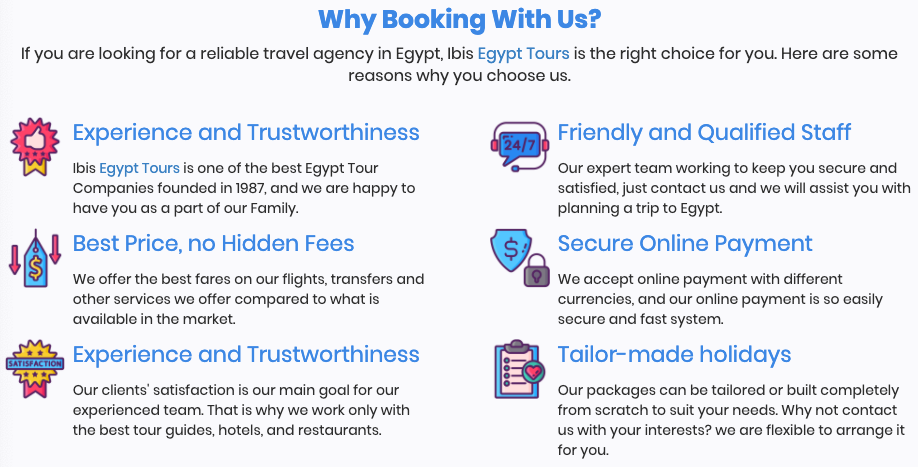
Source: Ibis Travel
Companies in Ethiopia
Religious festivals are an important part of Ethiopian culture. Several local tour operators include religious tours within a broader portfolio of tours, such as His-Cul Tour & Travel and Passion Ethiopia Tours. Passion Ethiopia Tours, which also promotes Muslim and Christian pilgrimages, has a section of its website to displaying religious paintings.
Grand Holidays Ethiopia Tours promotes itself as a local adventure specialist tour operator. Alongside their main portfolio of trips, they also offer a range of fixed date itineraries to enjoy the country’s religious festivals, including Timket, Meskel along, Christmas and Easter. They also offer custom tours and a wide range of other services. This operator is listed as one of National Geographic’s Best Adventure Travel Companies and has won an award by the Ethiopian Ministry of Culture and Tourism for its contribution to tourism in Ethiopia. Their site is available in English, German, and Chinese, a clear indicator of the markets they target.
Companies in India
With a vast number of religious sites, Tour My India, offers a wide range of pilgrimage tour packages segmented by religion (Hindu, Buddhist, Sikh, Muslim, Jain, Christian). Their site also provides lots of content for travellers to research in advance, including sections for research on best-selling pilgrimage tour packages and pilgrimage package by religion type. This operator is certified by Indian tour and travel associations and international organisations.
Pilgrimage Tour is a specialist religious tour operator that offers package tours and pilgrimages (yatra in Sanskrit) to a huge number of India’s holy centres and destinations, including the sacred city of Varanasi, the Char Dham Yatra, and Devi Darshan. This operator maintains an active blog page with some recent posts, in spite of the COVID-19 crisis, and also encourages interaction through social media platforms, such as Facebook, Twitter and Instagram.
Companies in Myanmar
With almost 1,200 Tripadvisor reviews, Oriental Ballooning operates hot air balloon flights in several locations in Myanmar, including Bagan, Mandalay, and Inle. The business is seasonal, operating broadly between October and April each year. Balloon pilots are fully trained and usually speak other languages, including French and German. The company offers its employees the opportunity of learning English for free to improve their skills and opportunities for the future. Oriental Ballooning has partnered with general tour operator Awinka Travels & Tours to reach additional customers.
Shan Yoma Travel & Tours is a general tour operator that offers pilgrimage tours to various destinations, including Bagan, Yangon, and Mandalay. In many itineraries, a pilgrimage is combined with culture, adventure and wellness tours. The operator is committed to sustainable and responsible tourism and is a certified Travelife Partner. Its website is available in multiple languages including English, French, and Portuguese. They also provide the useful guide Do’s and Don’ts Guide for Tourists which includes information specific to religious tourists.
Chart 6: Do’s and Don’ts for Tourists
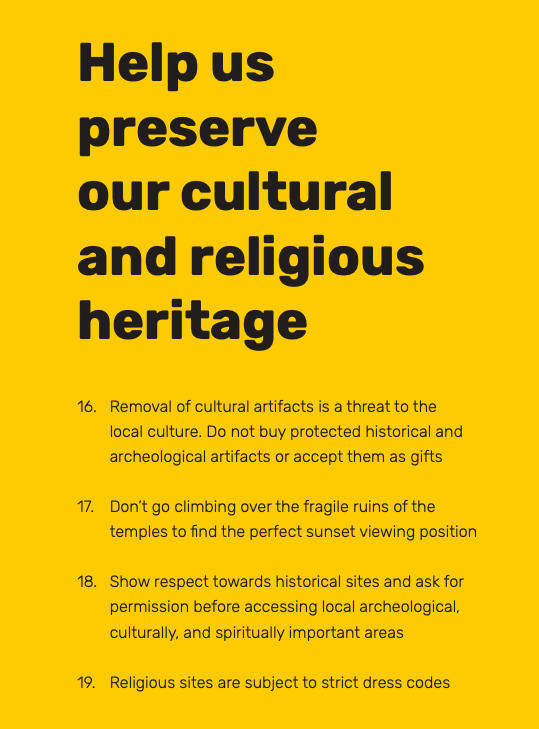
Source: Ministry of Hotels & Tourism, Myanmar
Companies in Palestine
Murad Tours offers a range of tours to holy sites in the West Bank and Jerusalem, along with Jericho and the Dead Sea. Their tours also offer an insight into the Palestinian way of life and culture. This operator provides day tours, multi-day tours and private tours ranging from three to eight days. The website also provides a link to Made in Peace, an online shop that sells fair-trade goods from the Holy Land, as well as their other partners.
HLA Tours is located in Bethlehem, offering a range of cultural, religious, and adventure tours in the Holy Land, Jordan and Egypt. Christian pilgrimages and Muslim pilgrimages form part of their religious tours portfolio, each featuring a number of choices for clients. Their website is available in English and French, and soon in Arabic.
Companies in Peru
Peru’s spiritual culture is a common theme amongst Peruvian tour operators. Outer Travels Inner Journeys offers a number of pilgrimages and retreats throughout Peru’s spiritual destinations. The Inspiration section of their website offers insights into Peru as a spiritual destination, with interviews and blog posts, They have also created an online shop selling spiritual book titles and artworks. This operator is very active on social media (Facebook, Instagram, Pinterest) and boasts notable media reviews.
Peru Sacred Tours offers spiritual journeys to sacred sites and retreats in Peru, aiming to provide a ‘magical experience’ to travellers. This operator also works with native healers and shamans (curanderos) who provide ceremonial and spiritual experiences at retreat centres for their customers.
Inkayni Peru Tours is an official Inca Trail Operator that also offers a range of sacred and mystical tour options. It has won numerous awards, including TripAdvisor Certificate of Excellence (recently rebranded as Travelers’ Choice) for several years in a row, Tour Radar’s Travellers’ Choice awards, and is Rainforest Alliance Certified.
Companies in Thailand
Day Tours Bangkok is a local operator that specialises in online tour bookings to a variety of attractions, experiences and activities including religious destinations such as the UNESCO designated Ayutthaya Temples. They offer shared tours, private tours and multi-day packages in the Kanchanaburi region. This operator clearly indicates what is included in the trip and what is not, and uses inspirational images to promote its products.
Specialising in Northern Thailand, Hosanna Chaing Mai Tours offers a range of activities, including trips to visit temples in the region. Their trips are usually combined with other activities in the region, such as visiting hill tribes. The operator is licensed by the national tourist board, Amazing Thailand.
Which products are you competing with?
For European religious tourists, a trip to a destination to visit religious attractions, such as places of worship or other religious sites, are often included within a wider itinerary of activities and experiences. Europeans travelling developing countries farther away may combine such a trip with adventure. Therefore, you should consider that competitive products include a wide range of adventure tourism activities.
Tips:
- To attract the general religious tourist, package your trip or experience with other adventure activities that exist in your destination. This will add value to your assortment and help you stand out from the competition.
- To find out more about the European adventure market, consult the CBI study Opportunities in the European Adventure Tourism Market.
4. What are the prices for religious travel products on the European market?
The prices of religious tourism trips and experiences vary widely based on duration, location and type. The table below gives an indication of the variety in this competitive market. When pricing your trip, make sure you know what all your costs will be, including transportation costs and entry fees to attractions, if you decide to add them to the final price.
Table 7: Sample prices for religious and spiritual trips and experiences in developing countries
| Religious Trips and Experiences | Country | Duration | Price per person € |
| Day Trips or Experiences | |||
| Private Spiritual Morning with Thai Monks | Thailand | 3 hours | 25 |
| Arba Minch – Visit to Orthodox Church plus local market and coffee tour | Ethiopia | 4 hours | 26 |
| 5 UNESCO Temples Tour in Ayutthaya | Thailand | 5–10 hours | 39 |
| Jerusalem Old City Tour | Palestine | 3 hours | 41 |
| Ancient Temples Private Tour | Myanmar | 9 hours | 46 |
| Divine Delhi – Spirituality and Beliefs of India | India | 4 hours | 49 |
| Tour to Coptic Cairo and Cave Church of St Simon | Egypt | 8 hours | 53 |
| Tour to Wadi el Natroun Monastery | Egypt | 8 hours | 67 |
| Tour to Citadel, Coptic and Islamic Cairo | Egypt | 7 hours | 71 |
| Temples and Religion Tour in Ahmedabad | India | 8 hours | 78 |
| Grand Palace, Wat Pho and Wat Arun – Bangkok | Thailand | 3–5 hours | 79 |
| Temple of the Moon Horseback Ride | Peru | 3 hours | 81 |
| Tour of Bethlehem | Palestine | 8 hours | 85 |
| Sacred Valley Ruins Tour | Peru | 8 hours | 90 |
| Ancient Cities and Temples of Belur, Halebeedu and Shravanabelagola | India | 11 hours | 153 |
| Hot Air Balloon Ride over Bagan Temples | Myanmar | 1 hour | 354 |
| Multi-day Trips or Experiences | |||
| Peaceful Puducherry and Tirupati Darshan | India | 6 days | 182 |
| Explore Chaing Mai and Chaing Rai | Thailand | 3 days | 190 |
| Char Dham (from Delhi) | India | 12 days | 376 |
| Christian Tour of Egypt | Egypt | 6 days | 453 |
| Jerusalem and the West Bank | Palestine | 3 days | 613 |
| Myanmar Catholic Pilgrimage | Myanmar | 6 days | 724 |
| Myanmar Buddhists Pilgrimage | Myanmar | 9 days | 906 |
| Holy Christian Sites and Nile Cruise Trip | Egypt | 10 days | 1,478 |
| Peru Pilgrimage | Peru | 9 days | 1,509 |
| Machu Picchu, Sacred Valley, Cusco Spiritual Tour | Peru | 7 days | 1,687 |
| Meskel Festival and Historic Route Tour | Ethiopia | 9 days | 1,767 |
| Ethiopian Timket Festival Tour | Ethiopia | 9 days | 1,965 |
Source: Acorn Tourism Consulting
Notes: Multi-day experiences do not include international airfares.
Tips:
- For advice on setting prices, consult the CBI study 10 tips for doing business with European tourism buyers, particularly the section Set a fair price for your services.
- Tourism Australia’s Pricing your tourism product offers helpful advice in making sure your prices are consistent, accurate and competitive.
This study was carried out on behalf of CBI by Acorn Tourism Consulting Limited.
Please review our market information disclaimer.
Search
Enter search terms to find market research
